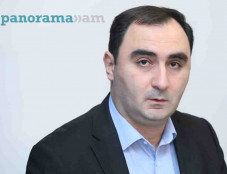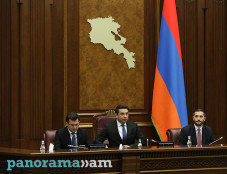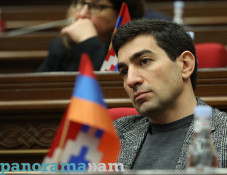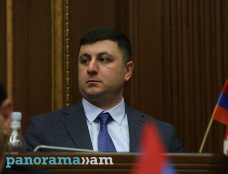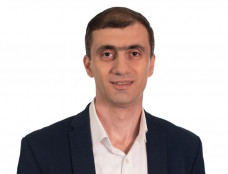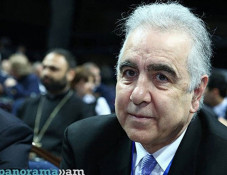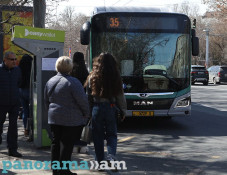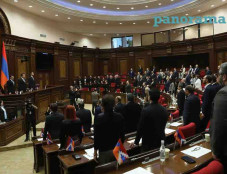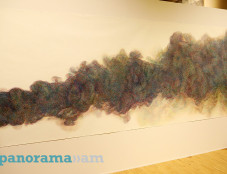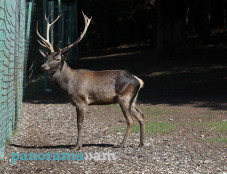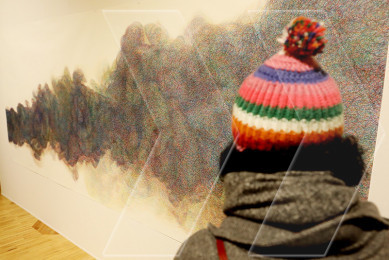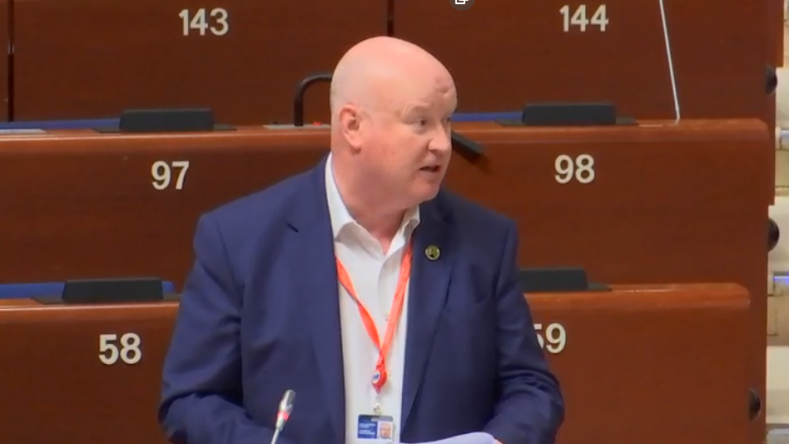
Irish lawmaker: Azerbaijan continues to occupy parts of Armenian territory
Irish Senator Paul Gavan condemned the latest Azerbaijani invasion of Armenia and the horrendous execution of Armenian soldiers by Azeri troops as he delivered opening remarks at a PACE debate on "Military hostilities between Azerbaijan and Armenia, including strikes against settlements and civilian infrastructures" on Monday.
The full text of his statement is provided below.
"Good afternoon and thank you, Madam Chairperson.
On 12 September 2022, a series of clashes erupted between Azerbaijani and Armenian troops on Armenian territory.
The violence resulted in nearly 300 deaths and dozens of injuries on both sides over a three-day period.
At least 204 Armenian servicemen were killed or missing, while Azerbaijan acknowledged 80 fatalities amongst its forces, bringing the total number killed to at least 284.
A ceasefire brokered by Russia on 13 September broke down within minutes, but thankfully, a new ceasefire was successfully concluded between the two countries the following day, 14 September, with considerable international assistance.
I think it is significant that all of the violence took place on Armenian territory. None of the violence took place in the vicinity of the disputed region of Nagorno-Karabakh.
Furthermore, the violence included strikes against settlements and civilian infrastructures. These have been well documented. They include attacks on the spa town of Jermuk, where numerous residential and tourist locations were hit by shells and other military weapons, including the ropeway, three hotels, a sanatorium, and a cafe. In Sotk, 200 houses and a municipality building were damaged. In total, according to Armenia’s Security Council, 36 towns and villages were targeted, including Goris, Sisian, Kapan, Vardenis, Tegh and Geghamasar. The Armenian government tells us that 4 civilians were killed, 1 more was missing, and 7 wounded.
It is significant that Azerbaijan does not deny launching these attacks, but rather has accused Armenia of using civilian and residential structures as firing points, and argued that, therefore, they were legitimate targets.
I do not believe this to be an acceptable response.
I also note that Azerbaijan has referenced and blamed "large scale provocations" from the Armenian side.
But surely, in this year, above all years, we must all be clear that it is never acceptable for one country to invade the sovereign territory of another.
It is also important to note that Azerbaijan continues to occupy parts of Armenian territory as a result of this incursion. And again, this is unacceptable.
There have been disturbing reports of possible war crimes being committed by the Azerbaijani armed forces, horrific video evidence of seven Armenian soldiers being executed, and also desecration of female bodies.
I have seen these videos and they are truly horrendous in their content, and indeed they may constitute evidence of war crimes.
I further note that Check News, the respected fact checking site, has examined the video and found nothing to indicate that it is a fake. They have also established that it was first shared on Azerbaijani Telegram channels, and it did significant work to geolocate the site of the video as being in the mountains of Lake Sev. It also confirmed that it was very likely made in the time period that would correspond to the outbreak of this conflict.
It is also important to note that the Azerbaijan government has said that if the video proves to be genuine, they will seek prosecutions for these actions.
I also note correspondents from Azerbaijan stating that they have uncovered evidence of potential war crimes that were committed in the earlier conflict in the 1990s, when parts of Azerbaijan's sovereign territory were occupied by Armenia.
They referenced the discovery of mass burial sites, and evidence of torture and executions. We must never forget that there are still 4 000 Azeris and 1 000 Armenians missing from that earlier conflict.
Having witnessed firsthand last year the evidence of the aftermath of occupation by Armenian forces – specifically the destruction of Agdan, rightly described as the Hiroshima of the West – there is no doubt in my mind that these charges too, require thorough investigation.
Indeed, I think it only fair to reflect that the Council of Europe did not pay enough attention to the whole issue of occupation by Armenian forces of up to a fifth of Azeri territory for the best part of three decades.
But again I have to be clear: these charges, these potential war crimes from this earlier period in no way justify this most recent incursion by Azerbaijan.
What makes these events particularly regrettable is that they took place just two weeks after a fourth round of EU-mediated, high level talks in Brussels between the two leaders – Azerbaijani president Mr Ilham Aliyev, and Armenian prime minister Mr Nikol Pashinyan – where progress was being made.
I understand that difficult issues around transportation routes, a possible interstate treaty, and the rights and security of Karabakh Armenians had all been advanced to some degree.
Last year, I was rapporteur with regard to the humanitarian consequences of the 44-day conflict that broke out in 2020. I highlighted key issues around the disappeared, deaths from mines, Armenian prisoners of war, and hate speech – all of which remain largely unresolved. Indeed, I note there are 259 either deaths or serious injuries from mines over the last couple of years.
None of these issues will be resolved by war. I would note the observation of Mr Thomas de Waal, that the biggest stumbling blocks with regard to resolving all of these broader issues is the total lack of consequences for whichever side says no to compromise and agreement.
I believe that all members of this Parliamentary Assembly must be clear that the use of military force is totally unacceptable in settling disputes between Council of Europe member states.
My report called on the Committee of Ministers to play particular attention to the needs of displaced persons, and focus on confidence-building measures for all affected communities, and measures necessary to build tolerant societies and tackle hate speech. Regrettably, we seem still very far away from such a scenario.
The pressing need now is for both sides to reengage in peace talks without further delay.
We need to see much greater effort from the international community to ensure that this happens.
Above all, we cannot have this issue being subject to global political gains between superpowers vying for influence and control.
I also believe Türkiye, which played a significant role in supporting Azerbaijan during the last outbreak of violence in 2020, should adopt a more balanced approach to the wider issues of establishing a just and lasting settlement between these two countries.
In this regard it is welcome news that both Armenia and Azerbaijan have agreed to a civilian EU mission alongside their border. I understand the mission will start by the end of this month, and aims to delineate the border between the two countries.
The proposed timeline of two months seems rather short to me, but the real significance of this decision is that it arose from a meeting involving both prime ministers, as well as European president Mr Charles Michel and French president Emmanuel Macron.
In conclusion, I hope this mission will act to build confidence and dialogue between both countries.
We cannot see any further slideback towards conflict; it resolves nothing. All it does is further delay justice for all of those families of the disappeared, and victims of the war on both sides.
Thank you."
Related news
- Austrian MP: Armenian POWs still held in Azerbaijan have to go back home
- 'There are two paths forward in Nagorno-Karabakh', Armenian MP tells PACE
- Swedish MP says 'still haunted' by Azerbaijani atrocities against Armenian POWs
- Azerbaijan must withdraw from Armenian territory, French MP tells PACE
- Latest Azeri attack happened because 'aggressor wasn't condemned before', Armenian MP tells PACE
Newsfeed
Videos





